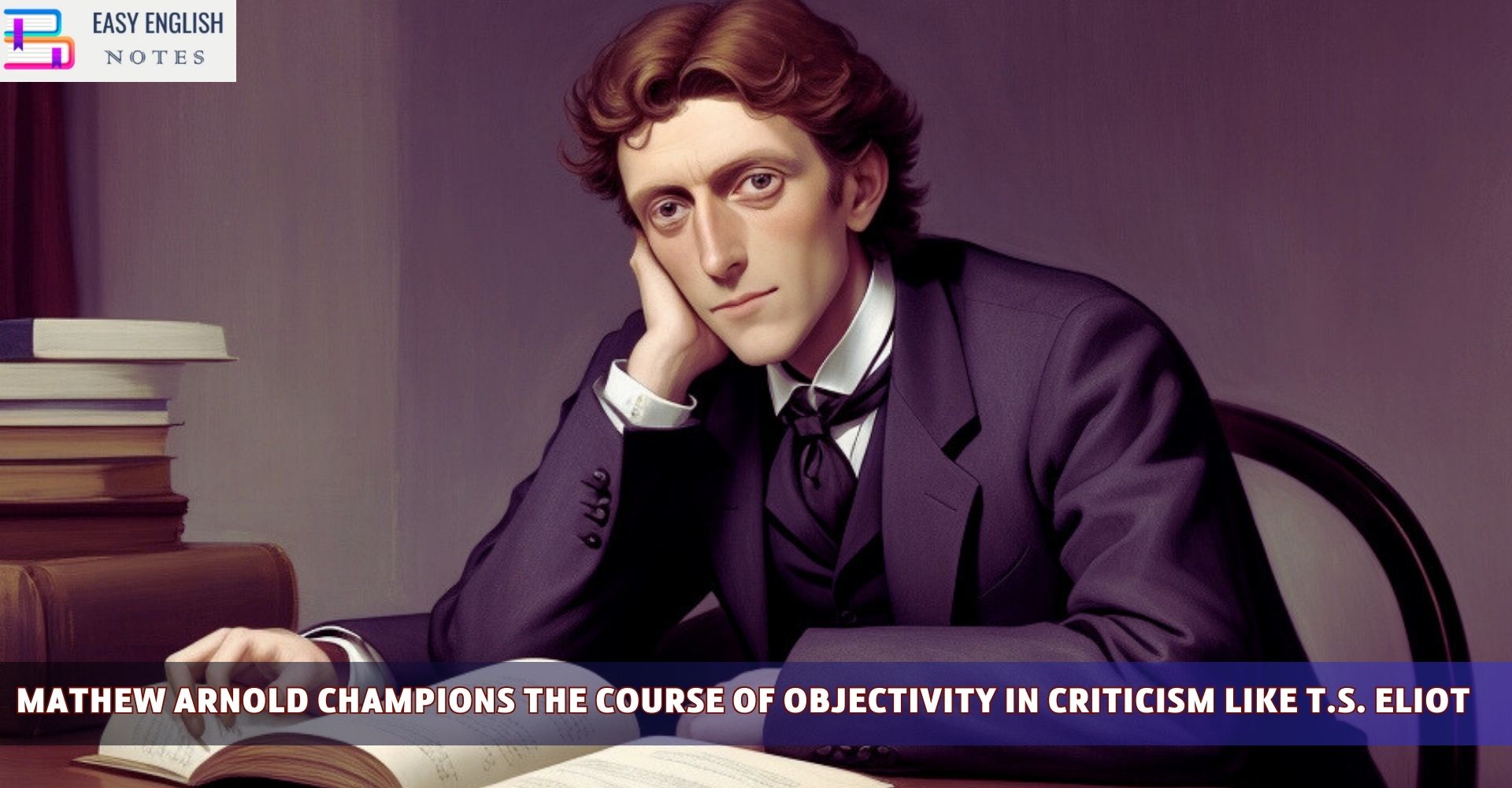To the extent Mathew Arnold gives preference to objective or a critical organisation of the poetic material he might be compared to T.S. Eliot. Like T.S. Eliot his essay are also manifestoes of ‘disinterestedness’ in criticism. He was using criticism in a very broad sense, not in merely the sense of scrutiny of literary works-it was to him an “intellectual and spiritual activity which occurs when the mind is in a state of disinterestedness.” It is in such a state of mind that true creative activity takes place. As a poetic genius is directed mainly towards synthesis such a frame of mind immensely suits him. Further, Arnold clarifies that he must have, the inspiration of “a certain intellectual and spiritual atmosphere. by a certain order of ideas, when he finds itself in them, of dealing divinely with these ideas.”
To his mind, criticism has a lofty aim it is to make novel ideas acceptable, to make ideas reach the very body of society. The poet visualises the ideas; the business of the critic is to propagate them. Being a romantic at heart. Arnold understood the literating value of imagination. At another place he names this faculty “Indian virtue of deachment.” It appears that like his contemporaries he had studies. The Bhagvad Gita in translation and was charmed by its spell. What Lord Krishna thought to be an essential quality of mind for spiritual realization, Arnold regarded the same to be essential for both creative and critical pursuits.
It is this connection that he asks the poet to select an excellent action. By excellent action he meant those actions which most powerfully appeal to the great primary affections. In this stress on primary human affections one can mark the echo of Wordsworth who advocated a study of the life of the rural countryside. Arnold supports them further by saying that primary human affections are centered in those elementary feelings which subsist permanently in the race, and which are independent of time. To the elementary part of our nature, to our passions, that which is great is eternally interesting, and interesting solely in proportion to its greatness and to its passion. A great human action of a thousand years ago is more interesting to it than a smaller human action of today, even though upon the representation of this last the most consummate skill may have been expanded, and though it has the advantage of appealing by its modern language, familiar manners, and contemporary allusions, to all our transient feeling and interests.
Also Read :
- Compare Hamlet with Macbeth, Othello and other Tragedies
- “The Pardoner’s Tale” is the finest tale of Chaucer
- Prologue to Canterbury Tales – (Short Ques & Ans)
- Confessional Poetry – Definition & meaning
- Line By Line Explanation Of The Poem The Eve of St. Agnes
It may be urged, however, that past action may be interesting in themselves, but that they are not to be adopted by the modern poet, because it is impossible for him to be entirely clear in his mind. The external of a past action he cannot know with the precision of a contemporary, but his business in with its essentials. The outward man of Oedipus or of Macbeth. the houses in which they lived, the ceremonies of their courts, he cannot accurately figure to himself but actually they do not concern him. His business is with the inward man, with their feeling and behaviour in certain tragic situations, which engage their passions as men. These have in them nothing local and Carnal. They are as accessible to the modern poet as to a contemporary.
The date of an action, then, signifies nothing: The action itself, its selection and construction, this is what is all-important. This the Greeks. Arnold remarks, understood for more clearly than we do. The radical difference between their poetic theory and of a modern poet consists in this that with them, the poetic character of the action itself, and the conduct of it, was the first consideration, with the modern poets, Poets. attention is fixed mainly on the value of separate through and images which occur in the treatment of an action.
Arnold explains also why the Greek tragic poet was confined to so limited a range of subjects. The plain reason in that there are so few actions which unite in themselves, in the highest degree, the conditions of excellence. A few actions, therefore, eminently adapted for tragedy. maintained almost exclusive possession of the Greek tragic stage. The terrible old mythic story on which the drama was founded stood, before the audience entered the theatre, traced in its bare outlines on their mind. Then came the poet, embodying outlines, developing situations, not a word wasted, not a sentiment capriciously thrown in; stroke upon stroke the drama proceeded, until at last when the final words were spoken it stood before the audience in road sunlight, a model of immortal beauty.
PLEASE HELP ME TO REACH 1000 SUBSCRIBER ON MY COOKING YT CHANNEL (CLICK HERE)











